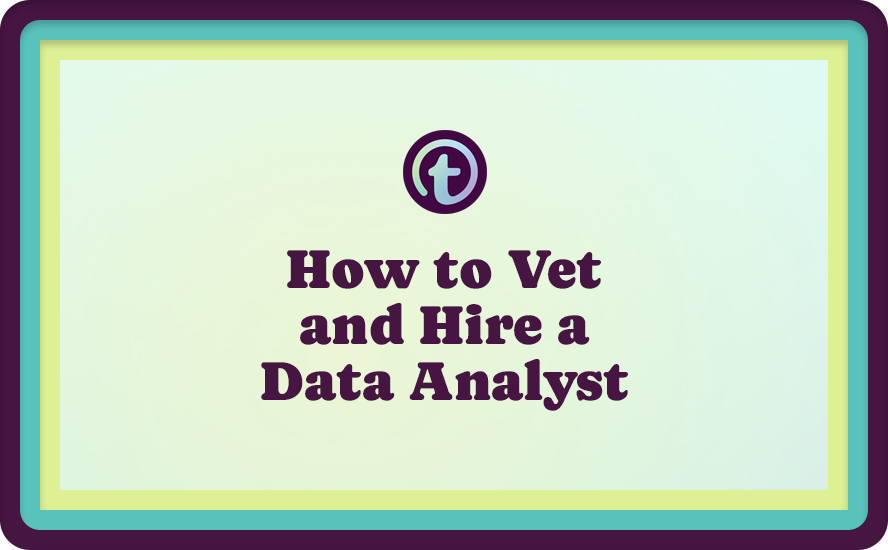Data analysts play an important role in software development and other tech applications — and that makes data analysts an important part of your team. When it comes to software development, data analysts play a key role in the design and development of software applications, the testing of software, the deployment of software applications, and continued maintenance and enhancements.
There is no doubt that data analysts play an important role for tech companies — but it may be even more important that you find the right fit and the right hire for your team. That means you need to take the right steps to vet and hire a data analyst. Truss may be able to help with this short guide on how to vet and hire a data analyst.
Contact Truss today for more information on our global hiring platform and employer of record (EOR) services!
READ MORE: How To Build a Remote Data Analyst Dream Team
How To Vet Remote Data Analysts
The process to find, recruit, vet, and hire data analysts for your software development team is not always so simple. Finding the right fit for your team is important to your success, which makes vetting potential candidates even more important. The vetting process to hire remote data analysts consists of three basic steps — a technical skills assessment, a remote work assessment, and a practical evaluation.

Here is a closer look at the steps you may want to take to vet remote data analysts for your software development team:
Technical Skills Assessment
Data analysis is an important piece of the software development puzzle and data analysts need to have a variety of technical skills in a variety of programming languages, in-depth knowledge of data visualization tools, and experience with statistical analysis. The technical skills assessment is an important part of the vetting process when you hire remote data analysts and you need to ensure that potential employees have the skills needed to help your tech company succeed and grow.
The technical assessment for data analysts should include tests of:
- Knowledge of Programming Languages: Data analysts are important to the programming of software applications and ideal candidates need to have knowledge and experience with SQL, Python, and R programming languages.
- Experience with Data Visualization: Data analysts are responsible for creating visual representations of key pieces of data and a qualified data analyst needs to have experience and skill with data visualization tools like Tableau and Power BI.
- Skill with Statistical Analysis: Analysis of key software data is the primary focus for data analysts and the ability to perform statistical analysis is vital to the job. Data analysts must be able to perform data analysis, identify patterns, and draw accurate conclusions from key data points.
- Experience with Data Wrangling: Raw data is important — but not as valuable as clean, structured data that has been formatted for your use. Data analysts need to have the skills to turn raw data into useful data.
- Basic Knowledge of Machine Learning Components: Data analysts play an important role in machine learning applications and need to have basic knowledge of machine learning and Business Intelligence (BI) tools to provide deeper insight.
Remote Work Assessment
The remote work assessment measures how well potential data analyst job candidates can work as part of a remote team and collaborate with other team members. This assessment will test many soft skills that remote data analysts need to have to be successful as a part of your team. Potential candidates need to be able to communicate and collaborate with project management platforms like Slack, Monday, Zoom, or Trello. This assessment, as a part of the interview process, needs to determine how well potential candidates communicate via email or phone. Additional soft skills that you need to assess include critical thinking, problem solving, attention to detail, communication, and collaboration.
Practical Skills Assessment
A list of skills and certifications on a resumé does not always translate to real-world experience and success — which makes a practical skills assessment an important part of the vetting process. This part of the process is a true test of problem solving and critical thinking skills, presenting potential employees with examples of the challenges, problems, and projects that will be a part of their day-to-day workload. This practical skills assessment can take the form of a coding challenge, live coding sessions, or in-depth skills reviews that test a candidate’s skills.
READ MORE: Essential Skills for Building a Remote AI/ML Team
Recruit, Vet, and Hire Remote Data Analysts with Truss
Does your tech company need to find and hire a data analyst for your team? You may not know how to vet and hire a data analyst — but Truss is here to help.
This overview highlights the three key assessments that you will want to employ to vet potential job candidates and find the right fit for your team. Truss can be a valuable resource to help you find, recruit, vet, and hire remote data analysts and talented software programmers in Central Asia and other regions around the world. Hiring remote tech employees provides companies with a wealth of benefits that include lower employment costs, a deeper talent pool, and diverse thought processes.
Truss has years of experience finding, hiring, and managing remote talent in the tech industry and has the capability to serve as your Employer of Record (EOR) in Central Asia, to ensure your company remains compliant with the local labor laws. We will provide you with a list of potential candidates that match your specific skillset criteria and help you with the vetting process when needed. When you have found the right fit, we will handle the onboarding process and continue to manage global payroll for your remote team members.
Contact Truss today to learn more about our global hiring platform and employer of record services!

